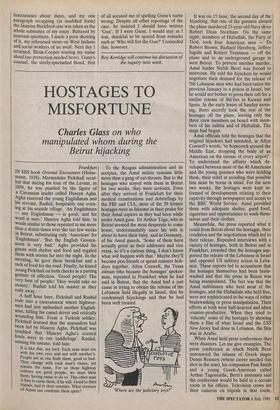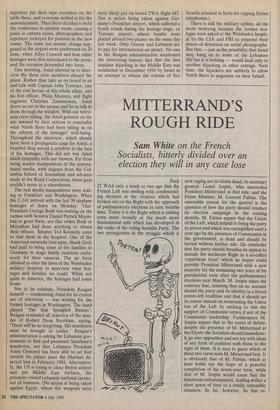HOSTAGES TO MISFORTUNE
Charles Glass on who
manipulated whom during the Beirut hijacking
Frankfurt IN HIS book Oriental Encounters (Heine- mann, 1918), Marmaduke Pickthall recal- led that during his tour of the Levant, in 1894, he was puzzled by the figure of a Circassian leader called Huseyn Agha. Agha received the young Englishman and his servant, Rashid, hospitably one even- ing at his seaside village. 'An Englishman — any Englishman — is good, and his word is sure,' Huseyn Agha told him, in words similar to those repeated to me more than a dozen times over the last few weeks in Beirut, substituting only 'American' for 'Englishman'. 'But the English Govern- ment is very bad.' Agha provided his guests with shelter and food and regaled them with stories far into the night. In the morning, he gave them breakfast and a sack of food for the road. Finally, he kissed Young Pickthall on both cheeks as a parting gesture of affection. 'Good people! The very best of people! They would take no money,' Rashid told his master as they rode away.
A half hour later, Pickthall and Rashid rode into a caravanserai where highway- men had just ambushed another English- man, killing his camel driver and critically wounding him. From a Turkish soldier, Pickthall learned that the marauders had been led by Huseyn Agha. Pickthall was troubled that 'Huseyn Agha's roasted fowls were in our saddlebags'. Rashid, sensing his unease, told him: It is like this, my lord. Each man must see with his own eyes and not with another's. People are as one finds them, good or bad. They change with each man's vision, yet remain the same. For us those highway robbers are good people; we must bless them; having cause to do so. This other man is free to curse them, if he will. Good to their friends, bad to their enemies. What creature of Adam can condemn them quite? To the Reagan administration and its acolytes, the Amal militia remains little more than a gang of cut-throats. But to the hostages who stayed with them in Beirut for two weeks, they were saviours. Even after they arrived in Frankfurt for their medical examinations and debriefings by the FBI and CIA, most of the 39 former hostages were as fulsome in their praise for their Amal captors as they had been while under Amal guns. Dr Arthur Toga, who in Beirut seemed the most desperate to come home, understandably since his wife is about to have their baby, said in Germany, of his Amal guards, 'Some of them have actually given us their addresses and vice versa, so it's a curious thing.. I don't know what will happen with that.' Maybe they'll become pen-friends or spend summer holi- days together. Allyn Conwell, the Texas oilman who became the hostages' spokes- man, repeated in Frankfurt what he had said in Beirut, that the Amal had a just cause in trying to obtain the release of the Lebanese held illegally in Israel, that he condemned hijackings and that he had been well treated.
'Where are the judiciary toys?' It was on 15 June, the second day of the hijacking, that one of the gunmen aboard the plane murdered 23-year-old Navy diver Robert Dean Steatham. On the same night, members of Hizballah, the Party of God, took four American men — Dr Robert Brown, Richard Herzberg, Jeffrey Ingalls and Robert Trautman — off the plane and to an underground garage in west Beirut. To prevent another murder, Amal leader Nabih Berri was forced to intervene. He told the hijackers he would negotiate their demand for the release of 766 Lebanese men who had been taken the previous January to a prison in Israel, but he would not bother to press their call for a similar release of Shi'ites in Kuwait and Spain. In the early hours of Sunday morn- ing, Berri secretly took the rest of the hostages off the plane, leaving only the three crew members on board with mem- bers of his militia and of Hizballah. The siege had begun.
Amal officials told the hostages that the original hijackers had intended, in Allyn Conwell's words, `to hopscotch around the Middle East, dropping the body of an American on the tarmac of every airport'. To understand the affinity which de- veloped between most of the 40 Americans and the young gunmen who were holding them, their relief at avoiding that possible fate must be borne in mind. For the next two weeks, the hostages were kept in- formed of developments relating to their captivity through newspapers and access to the BBC World Service. Amal provided them with adequate shelter, good food, cigarettes and opportunities to wash them- selves and their clothes.
Meanwhile, the press reported what it could from Beirut about the hostages, their condition and the negotiations which led to their release. Repeated interviews with a variety of hostages, both in Beirut and in Frankfurt, revealed that the hostages sup- ported the release of the Lebanese in Israel and opposed US military action in Leba- non. These reports led to accusations that the hostages themselves had been brain- washed and that the press in Beirut was being manipulated. The fact was that the Amal militiamen who held most of the hostages, and the Hizballahi who held five, were not sophisticated in the ways of either brainwashing or press manipulation. Their efforts at both were half-hearted and often counter-productive. When they tried to 'educate' some of the hostages by showing them a film of what Israel and the USS New Jersey had done in Lebanon, the film was in Arabic.
When Amal held press conferences they were disasters. Let me give examples. The press conference at which Nabih Berri announced the release of Greek singer Demis Roussos (whose career needed this shot in the arm), his companion Pam Smith and a young Greek-American called Arthur Tagontsidis, Bern's assistants said the conference would be held in a certain room in his offices. Television crews set their cameras on tripods in that room, reporters put their tape recorders on the table there, and everyone settled in for the announcement. Then Bern decided to hold the conference in another room, causing a panic as camera crews, photographers and reporters jockeyed for position in the new venue. The same last minute change hap- pened at the airport news conference on 20 June, when Allyn Conwell and four other hostages were first introduced to the press, and the occasion descended into farce.
One morning, Amal allowed us to inter- view the three crew members aboard the plane. Rather than take us on board to sit and talk with Captain John Testrake, one of the real heroes of this whole affair, and his first officer, Philip Maresca, and flight engineer Christian Zimmerman, Amal drove us out to the tarmac and let us talk to them through the window. With our televi- sion crew rolling, the Amal gunmen on the site seemed by their actions to contradict what Nabih Berri had been telling us on the subject of the hostages' well-being. Throughout the interview, which should have been a propaganda coup for Amal, a bearded thug waved a revolver in the face of the hostages. This did not win Amal much sympathy with our viewers. Far from being master manipulators of the interna- tional media, with degrees from the Col- umbia School of Journalism and advance study at the Rand Corporation, these guys couldn't score in a whorehouse.
The real media manipulators were wait- ing in Frankfurt and Washington. When the C-141 arrived with the last 39 airplane hostages at dawn on Monday, Vice- President George Bush was waiting on the tarmac with Senator Daniel Patrick Moyni- han to greet them, not that either Bush or Moynihan had done anything to obtain their release. Senator Ted Kennedy came to visit them in the hospital. One of the American networks (not mine, thank God) had paid to bring some of the families to Germany to stage family reunions exclu- sively for their cameras. The air force allowed us onto the lawn of the Wiesbaden military hospital to interview what hos- tages and families we could. While not quite in America, the hostages had come home.
Not to be outdone, President Reagan himself— condemning Amal for its cynical use of television — was waiting for the former hostages in Washington. The band played 'The Star Spangled Banner', Reagan reminded all America of the mur- der of Robert Dean Steatham, saying, 'There will be no forgetting. His murderers must be brought to justice.' Reagan's administration is asking the Lebanese gov- ernment to find and prosecute Steatham's murderers, not that Lebanese President Amin Gemayel has been able to set foot outside his palace since the Marines de- serted him in February 1984. Alternative- ly, the US is trying to close Beirut airport and put Middle East Airlines, the privately-owned Lebanese national carrier, out of business. (No action is being taken against Egypt, where the weapons were most likely put on board TWA flight 847. Nor is action being taken against Ger- many's Frankfurt airport, which suffered a bomb attack during the hostage siege, or Toronto airport, where bombs were placed aboard two planes on the same day last week. Only Greece and Lebanon are to pay for international air piracy. No one in the Reagan administration mentioned the interesting historic fact that the first airplane hijacking in the Middle East was conducted in December 1954 by Israel in an attempt to obtain the release of five Israelis arrested in Syria for tapping Syrian telephones.) There is still the military option, all the more worrying because the former hos- tages were asked at the Weisbaden hospit- al by the CIA and FBI to pinpoint their places of detention on aerial photographs. But that — just as the possibility that Israel may hang on to some of the Lebanese Shi'ites it is holding — would lead only to another hijacking or other outrage. Next time, the hijackers are unlikely to allow Nabih Berri to negotiate on their behalf.



















































 Previous page
Previous page